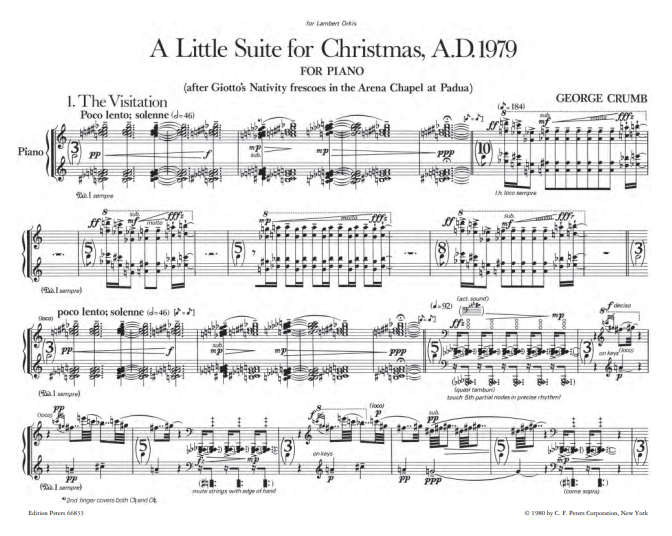
Happy Present Meet
Crumb a Little Suite for Christmas, A.D. 1979 (1980) for Piano Solo
after Giotto's Nativity frescoes in the Arena Chapel at Padua
Solo piano - Difficulty: difficult
1. The Visitation
2. Berceuse for the Infant Jesu
3. The Shepherd's Noel
4. Adoration of the Magi
5. Nativity Dance
6. Canticle of the Holy Night
7. Carol of the Bells
20th Century.
Collection. With standard notation, performance notes and introductory text (does not include words to the songs).
Composed 1980.
Duration 15m
Composed for pianist Lambert Orkis
"The idea of a set of piano pieces reflecting on different aspects of the Christmas event may remind the reader of the Vingt Regards sur l'Enfant-Jésus (1944) of Olivier Messiaen, and one can point to certain general stylistic traits shared by Messiaen and Crumb. But Crumb's work is on a much more modest scale than the French composer's massive pianistic compendium. In fact, it is a 'little' suite by comparison with several earlier piano works by Crumb. It does not call for the piano to be amplified to create the 'larger-than-life' sound quality desired in the four volumes of Makrokosmos (1972, 1973, 1974, 1979). Nor does the piece involve 'symbolic' notations (where the staves are arranged in shapes of a cross or circle), vocal effects from the performer, or the use of additional objects to modify the piano sound, all of which appear in the Makrokosmos series. However, in the Little Suite, Crumb does continue in his refined use of harmonics, muted tones, and pizzicati, using these in combination with material performed on the keyboard in the conventional fashion.
The music created with these means is sometimes contemplative in mood, as in the hushed reverence of the second movement, or the surreal setting of the 16th century 'Coventry Carol' in the sixth; sometimes visionary, as in the solemn repeated chords and melodic patterns of the first movement or the exuberant cosmic dance of the fifth.
Crumb uses a curious example of self-reference in the fourth piece. In this movement, there appears twice, in pizzicati, a melodic fragment from the 'Wanderer-Fantasy' movement of Music for a Summer Evening. A connection is thus made with the Magi who have "wandered" from afar to Bethlehem. Although this is a particularly private example of musical symbolism, it is consistent with Crumb's use of quotation to add an additional level of musical expressiveness." (James Primosch)<.
작곡가 Crumb, George
